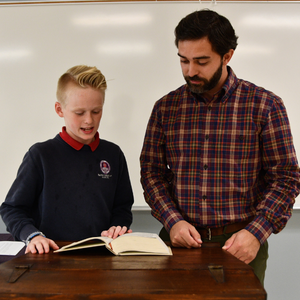-1.png)
Rhetoric, as a classical educational course, develops confidence and competence in public speaking as well as providing opportunity for students to learn time-tested categories for unpacking and organizing truth.

Students practice speaking in front of peers and audience.

Other classes, such as Logic, prepare students for Rhetoric classes.

Presenting and defending Senior Thesis utilizes Rhetoric to its fullest.
Why Rhetoric?
“Why is Rhetoric the most important class you’ll ever take?”
It was a routine question for me to ask my new ninth-grade students. The audacious question echoed for only a moment around the classroom till the students quickly responded from memory: “Rhetoric is the faculty of discovering all the available means of persuasion in any given situation.”
“All” and “any.” Those are the key words. My students know to emphasize these words above the others in Aristotle’s classic definition of Rhetoric. This is, after all, a class about persuasive communication that applies everywhere, all the time.
If you ask anyone who has taken my Rhetoric course in the past dozen years or so, you will learn that I do make this daring claim at the beginning of the year: Rhetoric is the most important subject you can study. Of course, I add a caveat: Every teacher supposes that his or her course is the most important.... But – sporting only a hint of a smile – I always explain that, in this instance, my claim is actually the right one.
In this, I am not trying to reduce the value of all other courses of study. Math, Science, History, Music, Art, Languages, and, of course, Bible are all vastly important. My goal is to show that Rhetoric is about communication, and, without a well-tuned ability to communicate, our other studies do little to benefit the public good or to love our neighbors as ourselves. After all, of what good is a car if it doesn’t have wheels? Or, of what value is a head full of knowledge if it can’t mobilize that knowledge – sharing it in a clear and convincing way?
So, any good course in Rhetoric combs through all the means of persuasion brought to us from smarter minds of centuries past, and it applies to all of life in any given situation. All. Any. Those are the key words.
In Rhetoric, we seek to introduce students to the ancient wisdom of men like Aristotle and Plato who understood how persuasion works. And although our modern age has seen many changes (both constructive and destructive), the basic principles of communication and persuasion haven’t changed very much from ancient times. All the classical methods of communication and persuasion still apply in any given situation.
So in addition to developing confidence and competence in public speaking, our students learn time-tested categories for unpacking and organizing truth. The five “canons” of Rhetoric – discovery, arrangement, style, memory, and delivery – offer a course outline for us. We spend the year walking these ancient trails, and, as we do, we find writing and speaking well more attainable than before.
To get at truth, the good rhetorician must ask good questions. Again, the ancients come to our rescue with clear categories of thought which prompt some of the richest and deepest questions imaginable. We call this gold mine “the Common Topics.” My promise to students is: Once you have a handle on the Common Topics, you will never again say, “I can’t think of anything to write about….” (I used to hear this complaint multiple times a day in public school.) It’s now been nearly two decades since I have heard it at FCS. Yes, the Common Topics are really this powerful!
But if Rhetoric is so important and so powerful, you may be wondering why many of us have never studied it. Aristotle would, of course, be appalled at our modern impoverishment, and I have no solid answer as to why these studies disappeared from the accepted body of curriculum so long ago. What I do know is that the western world is reaping the horrendous consequences of a society that has forgotten the art of true communication and has no idea how to recover it.
Thankfully, our students have better opportunities. They may not all agree that Rhetoric is the most important class. But to build a convincing counter-argument, they will have to apply the best of rhetorical skill…!
And that should be a lot of fun to watch!
- Thomas Mann, FCS Faculty


-1.png?width=296&height=50&name=Back%20To%20All%20Stories%20(1)-1.png)